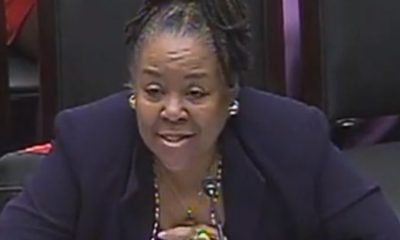#NNPA BlackPress
COMMENTARY: Capitol Hill hearing takes up the war between the needy and the greedy
NNPA NEWSWIRE — “Any universe with payday lending is answering the question of how to make poverty a sustainable profitable enterprise,” noted Boston’s Rep. Ayanna Pressley (D-MA). “Well a lot of people are getting rich off of keeping people poor. And so how do we reform anything that’s based on that premise? The short answer is, we don’t.”
By Charlene Crowell, NNPA Newswire Contributor
At an April 30 Capitol Hill hearing, the multi-dimensional problems wrought by small-dollar, high-cost loans were brought to the attention of lawmakers serving on the powerful House Financial Services Committee. A witness panel representing bankers, consumers, clergy, and public policy organizations taught, recounted, reasoned and preached to lawmakers on the rippling and disastrous effects of debt-trap loans.
Each addressed the industry that reaps billion-dollar profits from the poor: payday, car-title, and other triple-digit interest small-dollar products. The average annual interest rate for payday loans in the United States is 391% although in more than 17 states, many of them home to consumers of color, the APR is even higher.
As consumers suffer financially, it’s a different story for payday lenders: $4.1 billion in fees every year in the 33 states that allow these debt traps, according to the Center for Responsible Lending (CRL). Similarly, the annual fees generated on car-title loans was found to be $3.8 billion.
The session occurred as the current Administration seeks to permanently reverse a payday rule that was developed over five years of public hearings, research and comments that sought the input of consumers, financial institutions and other stakeholders. Announced by the first Consumer Financial Protection Bureau (CFPB) Director, the rule would require lenders to determine if a consumer could repay the loan, also known as the ability-to-repay standard.
With a new CFPB Director, the rule’s suspension was accompanied by an announcement of an intent to begin rulemaking anew. For the industry, the suspension provides yet another opportunity to take the teeth out of financial regulation. For consumers, long-awaited consumer protection that would have taken effect this summer is now indefinite.
With the average borrower earning $25,000 to $30,000 a year, whatever difficulty led them to a payday loan store or web site, made their lives even worse.
For Detroit resident Ken Whittaker, the hearing was a high-profile opportunity to share his personal experience with a $700 payday loan that wound up costing him $7,000, in addition to debt collections, a court judgment, and his tax refund garnished.
“I found I could not afford to pay off the first loan without taking out another one. Then I began a cycle of debt which lasted over a year,” testified Whittaker. “Soon I was paying $600 per month in fees and interest. I eventually closed my bank account to stop payments from being drawn out and leaving me without cash for my family’s rent, groceries and other essential bills.”
In the hearing’s most poignant moment, Whittaker appealed to the lawmakers saying, “Please support strong reform of predatory payday and car title lending for people like me. We work hard to support our families and make our finances stable, and this kind of lending only makes it harder.”
For one lawmaker, Boston’s Rep. Ayanna Pressley, Whittaker’s plea was heard loud and clear.
“Any universe with payday lending is answering the question of how to make poverty a sustainable profitable enterprise,” noted Rep. Pressley. “Well a lot of people are getting rich off of keeping people poor. And so how do we reform anything that’s based on that premise? The short answer is, we don’t.”
Todd McDonald, Senior Vice President and Board Director of the New Orleans-based Liberty Bank and Trust, a Community Development Financial Institution (CDFI) spoke at the hearing from the perspective of community banks. His own firm operates in eight states through 15 branches. He is also a board member of the National Bankers Association, the leading trade association for the nation’s Minority Depository Institutions.
“As a CDFI that serves a largely low and moderate-income consumer base that often utilizes these high-cost, small dollar loans,” testified McDonald, “Liberty often works to help our customers get out of these predatory loans and into more manageable products.”
Since 2008, Liberty Bank has offered a payday and car-title loan alternative known as Freedom Fast loans that averages just over $6,000 and comes with an average interest rate of 12.6%. Liberty provides these loans to customers with credit scores ranging from a low of 500 to higher than 700. It also reports payments to the credit bureaus so that customers can also build their credit ratings.
For the Rev. Dr. Frederick Douglass Haynes III, senior pastor of Dallas’ Friendship West Baptist Church and a leading partner in the Faith and Credit Roundtable facilitated by the Center for Responsible Lending, predatory lending is a matter of economic justice that deserves actions and not just hearings.
“Payday predators are a part of a hostile takeover of the economy of the unbanked and underserved. This exploitative industry targets and saturates communities that are already suffering from economic apartheid,” said Rev. Haynes to the lawmakers. “When the vulnerable are drowning in desperation the payday industry throws a ‘life preserver’ weighted with the iron of usurious interest rates.”
“We are calling for strong protections so that those who experience an emergency don’t end up drowning in debt they cannot repay,” added Rev. Haynes.” The pastor forcefully called for the CFPB to implement its “common sense rule” and for enacting legislation, like a bill introduced by Illinois’ Senator Richard Durbin, that would establish a national 36% interest rate cap while allowing states to have lower rate ceilings.
“Borrowers have described the debt trap, in their own words, as ‘a hole that you can’t get out of’, ‘soul-crushing’, and a ‘living hell’, Diane Standaert, a CRL EVP testified. “And research has shown time and time again, that these high-cost lending storefronts are disproportionately situated in Black and Latino communities, even when they have the same or higher incomes than white communities.”
The good Reverend Haynes agreed, adding, “The Bible teaches that nations will be judged by how they treat ‘the least of these’. It must not be said of this nation, “I was hungry, and you gave me a payday loan… I was given a bad hand and you gave me a bad plan.”
Amen, Reverend!
Charlene Crowell is the Communications Deputy Director with the Center for Responsible Lending. She can be reached at Charlene.crowell@responsiblelending.org.
#NNPA BlackPress
IN MEMORIAM: Ramona Edelin, Influential Activist and Education Advocate, Dies at 78
NNPA NEWSWIRE — Born on September 4, 1945, in Los Angeles, California, activist Ramona Edelin’s early years were marked by a commitment to education and social justice. According to her HistoryMakers biography, after graduating from Fisk University with a Bachelor’s degree in 1967, she pursued further studies at the University of East Anglia in England. She earned her master’s degree before completing her Ph.D. at Boston University in 1981.
The post IN MEMORIAM: Ramona Edelin, Influential Activist and Education Advocate, Dies at 78 first appeared on BlackPressUSA.

By Stacy M. Brown, NNPA Newswire Senior National Correspondent
@StacyBrownMedia
Once upon a time, Black Americans were simply known as colored people, or Negroes. That is until Ramona Edelin came along. The activist, renowned for her pivotal roles in advancing civil rights, education reform, and community empowerment, died at her D.C. residence last month at the age of 78. Her death, finally confirmed this week by Barnaby Towns, a communications strategist who collaborated with Dr. Edelin, was attributed to cancer.
Born on September 4, 1945, in Los Angeles, California, Edelin’s early years were marked by a commitment to education and social justice. According to her HistoryMakers biography, after graduating from Fisk University with a Bachelor’s degree in 1967, she pursued further studies at the University of East Anglia in England. She earned her master’s degree before completing her Ph.D. at Boston University in 1981.
Edelin’s contributions to academia and activism were manifold. She was pivotal in popularizing the term “African American” alongside Rev. Jesse L. Jackson in the late 1980s.
Jackson had announced the preference for “African American,” speaking for summit organizers that included Dr. Edelin. “Just as we were called Colored, but were not that, and then Negro, but not that, to be called Black is just as baseless,” he said, adding that “African American” “has cultural integrity” and “puts us in our proper historical context.”
Later, Edelin told Ebony magazine, “Calling ourselves African Americans is the first step in the cultural offensive,” while linking the name change to a “cultural renaissance” in which Black Americans reconnected with their history and heritage.
“Who are we if we don’t acknowledge our motherland?” she asked later. “When a child in a ghetto calls himself African American, immediately he’s international. You’ve taken him from the ghetto and put him on the globe.”
The HistoryMakers bio noted that Edelin’s academic pursuits led her to found and chair the Department of African American Studies at Northeastern University, where she established herself as a leading voice.
Transitioning from academia to advocacy, Edelin joined the National Urban Coalition in 1977, eventually ascending to president and CEO. During her tenure, she spearheaded initiatives such as the “Say Yes to a Youngster’s Future” program, which provided crucial support in math, science, and technology to youth and teachers of color in urban areas. Her biography noted that Edelin’s efforts extended nationwide through partnerships with organizations like the National Science Foundation and the United States Department of Education.
President Bill Clinton recognized Edelin’s expertise by appointing her to the Presidential Board on Historically Black Colleges and Universities in 1998. She also co-founded and served as treasurer of the Black Leadership Forum, solidifying her standing as a respected leader in African American communities.
Beyond her professional achievements, Edelin dedicated herself to numerous boards and committees, including chairing the District of Columbia Educational Goals 2000 Panel and contributing to the Federal Advisory Committee for the Black Community Crusade for Children.
Throughout her life, Edelin received widespread recognition for her contributions. Ebony magazine honored her as one of the 100 Most Influential Black Americans, and she received prestigious awards such as the Southern Christian Leadership Award for Progressive Leadership and the IBM Community Executive Program Award.
The post IN MEMORIAM: Ramona Edelin, Influential Activist and Education Advocate, Dies at 78 first appeared on BlackPressUSA.
#NNPA BlackPress
Tennessee State University Board Disbanded by MAGA Loyalists as Assault on DE&I Continues
NNPA NEWSWIRE — Recent legislative actions in Tennessee, such as repealing police reform measures enacted after the killing of Tyre Nichols, underscore a troubling trend of undermining local control and perpetuating racist agendas. The new law preventing local governments from restricting police officers’ authority disregards community efforts to address systemic issues of police violence and racial profiling.
The post Tennessee State University Board Disbanded by MAGA Loyalists as Assault on DE&I Continues first appeared on BlackPressUSA.

By Stacy M. Brown, NNPA Newswire Senior National Correspondent
@StacyBrownMedia
Tennessee State University (TSU), the state’s only public historically Black college and university (HBCU), faces a tumultuous future as Gov. Bill Lee dissolved its board, a move supported by racist conservatives and MAGA Republicans in the Tennessee General Assembly, who follow the lead of the twice-impeached, four-times indicted, alleged sexual predator former President Donald Trump. Educators and others have denounced the move as an attack on diversity, equity, and inclusion (DE&I) and a grave setback for higher education.
Critics argue that TSU’s purported financial mismanagement is a manufactured crisis rooted in decades of underinvestment by the state government. They’ve noted that it continues a trend by conservatives and the racist MAGA movement to eliminate opportunities for Blacks in education, corporate America, and the public sector.
Gevin Reynolds, a former speechwriter for Vice President Kamala Harris, emphasizes in an op-ed that TSU’s financial difficulties are not the result of university leadership because a recent audit found no evidence of fraud or malfeasance.
Reynolds noted that the disbanding of TSU’s board is not an isolated incident but part of a broader assault on DE&I initiatives nationwide. Ten states, including Tennessee, have enacted laws banning DE&I policies on college campuses, while governors appointing MAGA loyalists to university trustee positions further undermine efforts to promote inclusivity and equality.
Moreover, recent legislative actions in Tennessee, such as repealing police reform measures enacted after the killing of Tyre Nichols, underscore a troubling trend of undermining local control and perpetuating racist agendas. The new law preventing local governments from restricting police officers’ authority disregards community efforts to address systemic issues of police violence and racial profiling.
The actions echo historical efforts to suppress Black progress, reminiscent of the violent backlash against gains made during the Reconstruction era. President Joe Biden warned during an appearance in New York last month that Trump desires to bring the nation back to the 18th and 19th centuries – in other words, to see, among other things, African Americans back in the chains of slavery, women subservient to men without any say over their bodies, and all voting rights restricted to white men.
The parallels are stark, with white supremacist ideologies used to justify attacks on Black institutions and disenfranchise marginalized communities, Reynolds argued.
In response to these challenges, advocates stress the urgency of collective action to defend democracy and combat systemic racism. Understanding that attacks on institutions like TSU are symptomatic of broader threats to democratic norms, they call for increased civic engagement and voting at all levels of government.
The actions of people dedicated to upholding the principles of inclusivity, equity, and justice for all will determine the outcome of the ongoing fight for democracy, Reynolds noted. “We are in a war for our democracy, one whose outcome will be determined by every line on every ballot at every precinct,” he stated.
The post Tennessee State University Board Disbanded by MAGA Loyalists as Assault on DE&I Continues first appeared on BlackPressUSA.
#NNPA BlackPress
Braxton Haulcy and the Expansion of Walker|West Music Academy
May 24, 2023 – Walker West Music Academy gets an early start on expansion. Join us for a Wednesday episode of The …
The post Braxton Haulcy and the Expansion of Walker|West Music Academy first appeared on BlackPressUSA.

May 24, 2023 – Walker West Music Academy gets an early start on expansion. Join us for a Wednesday episode of The …
The post Braxton Haulcy and the Expansion of Walker|West Music Academy first appeared on BlackPressUSA.
-

 Community2 weeks ago
Community2 weeks agoFinancial Assistance Bill for Descendants of Enslaved Persons to Help Them Purchase, Own, or Maintain a Home
-

 Activism4 weeks ago
Activism4 weeks agoOakland Post: Week of April 3 – 6, 2024
-

 Business2 weeks ago
Business2 weeks agoV.P. Kamala Harris: Americans With Criminal Records Will Soon Be Eligible for SBA Loans
-

 Community2 weeks ago
Community2 weeks agoAG Bonta Says Oakland School Leaders Should Comply with State Laws to Avoid ‘Disparate Harm’ When Closing or Merging Schools
-

 Activism3 weeks ago
Activism3 weeks agoOakland Post: Week of April 10 – 16, 2024
-

 Community2 weeks ago
Community2 weeks agoOakland WNBA Player to be Inducted Into Hall of Fame
-

 Community2 weeks ago
Community2 weeks agoRichmond Nonprofit Helps Ex-Felons Get Back on Their Feet
-

 Community2 weeks ago
Community2 weeks agoRPAL to Rename Technology Center for Retired Police Captain Arthur Lee Johnson























































